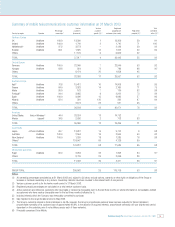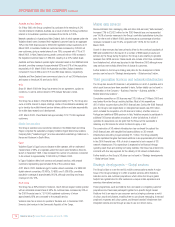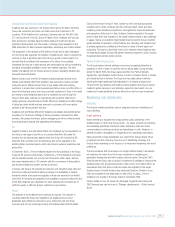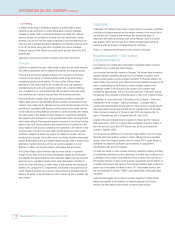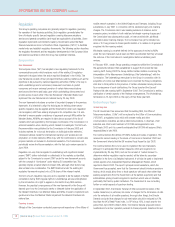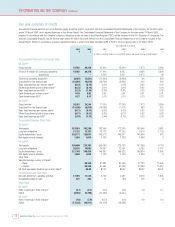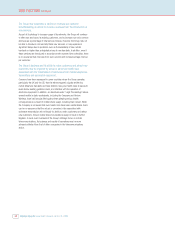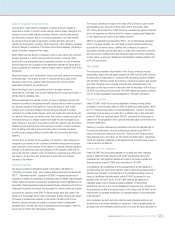Vodafone 2003 Annual Report Download - page 21
Download and view the complete annual report
Please find page 21 of the 2003 Vodafone annual report below. You can navigate through the pages in the report by either clicking on the pages listed below, or by using the keyword search tool below to find specific information within the annual report.
Vodafone Group Plc Annual Report & Accounts and Form 20-F 2003 19
the other mobile operators rejected the Director General’s proposed modifications
in November 2001 and, in January 2002, the Director General confirmed that he
had referred the matter to the Competition Commission. Oftel published the
Competition Commission’s conclusions in January 2003 and its full report was
published in February 2003.
The Competition Commission concluded that charges for call termination to all
four operators should reduce by 15% by 24 July 2003 and, in findings which it
claimed should have ‘persuasive effect’, that charges for call termination to
Vodafone UK and O2should fall by RPI minus 15% for the period July 2003 to
31 March 2004, the year ending March 2005 and the year ending March 2006.
The Competition Commission found that charges for call termination to Orange
and T-Mobile should fall by RPI minus 14% during the same periods. The Director
General is required to take the utmost account of the Competition Commission’s
findings under the Telecommunications Act, which is to apply until July 2003, and
the Director General has made licence modifications, which implement the
Competition Commission’s findings in respect of the period to July 2003. The
Director General is required to comply with the provisions of the new framework in
framing measures for the period after July 2003, but he has said that he will take
utmost account of the Competition Commission’s findings in doing so. Proposals
in respect of the period after July 2003 are subject to the appeals provisions
embodied in the new framework, as implemented by the Communications Bill.
The Competition Commission’s findings are themselves subject to Judicial Review
and Vodafone UK, Orange and T-Mobile have announced their intention to seek
permission to review from the High Court. It is not at this stage clear whether
such permission will be granted. The application is to be heard in June 2003.
In August 2002, the Government sought views on the possible introduction of a
specific offence to prohibit the use of any hand-held mobile phone or similar
device by drivers. The Government also invited comment on whether the
proposed offence should include hands-free and whether there should be any
exemptions from the proposed offence and indicated that it expected to
announce its conclusions in the first half of 2003.
Other countries
A number of NRAs have recently considered or are considering the regulation of
charges for the termination of calls to mobile networks. Existing European
regulation requires that operators designated as having SMP in the national
market for interconnection must offer cost-orientated charges for such services
and NRAs may also determine charges pursuant to interconnection disputes.
NRAs in Belgium and France have reached decisions during 2001/02 which both
resulted in reductions of approximately 15% in call termination charges in 2002
and further proposed reductions in 2003. The NRA in the Netherlands had its
decisions seeking to do so dismissed by the Court of Rotterdam, but the Dutch
Competition Authority continued to investigate call termination charges.
In addition, the Commission continues to investigate complaints against KPN and
Vodafone Netherlands, initiated in 1999. The Commission has issued a
Statement of Objections outlining its case against KPN, but not Vodafone
Netherlands. Some of the matters detailed in the KPN Statement of Objections
are specific to KPN but some, in relation to price squeezing in certain retail
markets, may be of more general applicability. A decision on this case is
expected in 2003.
In 2002, mobile operators in the Netherlands were investigated by the Dutch
competition authority, NMa, for alleged collusion in retail pricing. The operators
were found guilty and fined a total of 188 million. Vodafone Netherlands was
fined 124 million, which is currently the subject of an appeal.
The Swedish NRA published guidelines in April 2003 which may result in a
re-examination of 3G rollout obligations, but it is unclear at this stage how they
will be applied.
Central Europe Region
Germany
Current German telecommunications regulation requires all network operators to
allow interconnection of their public telecommunications networks with those of
other carriers. Cost orientation of interconnection prices applies only to dominant
operators in the relevant market. To date, the German NRA has not considered
any mobile operator to be dominant.
Other countries
Poland and Hungary, as EU accession countries, are required to implement EU
legislation into national law. To meet accession criteria, these countries are in the
process of implementing the current EU regulatory framework. The Commission
has advised EU accession countries that they will also be required to implement
the new framework.
In Hungary, an investigation into alleged collusion in setting mobile termination
rates has been extended. Vodafone Hungary filed their submission to the
Hungarian competition authority in January 2003. The final report is expected to
be issued by the end of August 2003.
Switzerland, although not part of the EU, is considering implementing parts of the
new regulatory framework for the purposes of “European compatibility”. In June
2002, the Swiss NRA removed certain roll out obligations from 3G licences. In
October 2002, the Swiss competition authority commenced an investigation of
mobile termination charges to assess potential collusion between mobile
operators.
Southern Europe Region
Italy
In July and September 2002, respectively, the Italian Competition Authority and
Commission approved the division of certain assets held by Blu amongst the
remaining mobile operators – Vodafone Italy, TIM and WIND.
TIM and Vodafone Italy have been designated as operators with SMP in both the
mobile and interconnection markets since 1999. In December 2001, the Italian
NRA directed the mobile operators to prepare a cost accounting model based on
fully allocated costs for the years 1999 and 2000 as an intermediate step for the
adoption of a long run incremental cost model to set call termination charges. In
February 2003 it announced that Vodafone Italy and TIM would each be required
to reduce their call termination rates by 12% on 1 June 2003, with further
reductions being expected in subsequent years. In August 2002, the Italian
authorities extended the term of the 2G and 3G licences held by all operators
from fifteen to twenty years.
Other countries
Mobile termination charges are subject to regulatory activity elsewhere in the
Southern Europe region. In January 2002, the Portuguese NRA issued a
decision, which reduced fixed to mobile termination charges to be applied by
mobile operators by 15% in 2002. The Portuguese NRA will reassess call
termination rates for 2003 in the light of market conditions. In Spain the NRA
required a reduction of 17% in call termination rates from 1 August 2002.
Subsequently, in December 2002, the Spanish competition authority conducted
unannounced inspections of the offices of Vodafone Spain and Telefonica
investigating allegations of price squeezing in the corporate market and
excessive call termination charges. The investigation is ongoing. The Greek NRA


